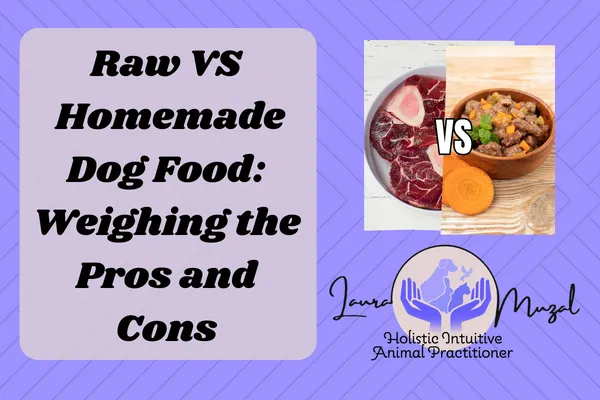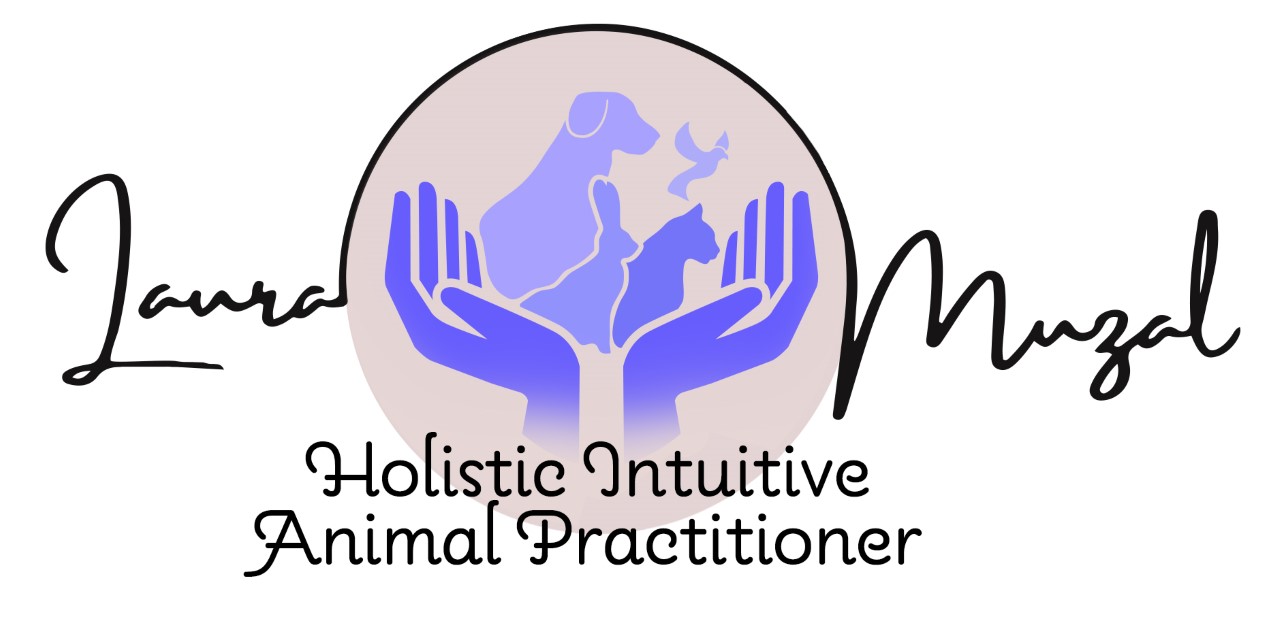Pawsitively Holistic: Your Guide to Pet Wellness

Raw VS Homemade Dog Food: Weighing the Pros and Cons

Raw VS Homemade Dog Food: Weighing the Pros and Cons
As devoted pet parents, we're always on the lookout for the best ways to keep our furry companions healthy and happy, particularly when it comes to their diet. Recently, there's been a lot of talk about the merits of raw, natural diets versus commercial or homemade cooked food for our dogs. Advocates of raw diets argue that it aligns with what their wild ancestors consumed, suggesting that cooked pet food might lose essential nutrients in the process. But how do these approaches truly differ when it comes to our pets' well-being?
If you've found yourself contemplating whether a natural or raw diet is the right choice for your dog, you're in the right place. Let's dive into the details and have an honest discussion about what these feeding approaches mean for our furry friends.
What Constitutes a Natural Diet for Dogs?
In the United States, the term "natural" in the context of commercial pet food is defined by the Association of American Feed Control Officials (AAFCO). According to AAFCO regulations, pet food labeled as "natural" must, at minimum, use natural preservatives. However, it's important to note that this label doesn't guarantee that the entire composition of the pet food is natural. Other non-natural ingredients and processing methods may still be used in the production of so-called "natural" pet food.

This raises an important point about the disparity between how regulatory bodies define "natural" and how pet parents interpret it. The trend in natural pet food leans towards incorporating whole ingredients such as meats, fruits, and vegetables, while steering clear of heavily processed components, refined grains, fiber sources, and byproducts. As responsible pet parents, it's crucial to choose options that align with our beliefs about what's natural and healthy for our pets. Without fully understanding the implications of our choices, we run the risk of selecting diets that may lack essential nutrients or even pose risks to our pets' health.
Is a Raw Food Diet the Best Choice for Dogs?
The reasoning behind raw food diets is rooted in the idea that dogs and cats, as carnivores, evolved to eat raw foods. Advocates argue that commercial pet foods, which undergo heat-processing, may lose natural and nutritionally beneficial elements. Although these claims may seem compelling to pet owners, their scientific validity can vary.
Raw food diets are typically classified into three main categories:
Commercially Available Complete Raw Food Diets: These are pre-packaged raw food diets that can be purchased from stores.
Homemade Complete Raw Food Diets: This category includes diets prepared at home.
Combination Diets: These diets combine commercially available supplement mixes with raw meat, providing a blended approach.
Supporters of raw diets for dogs frequently tout numerous health benefits associated with this feeding approach. While it's crucial to acknowledge that the scientific evidence supporting these claims can vary, one commonly cited advantage is the enhancement of coat and skin health, attributed to the natural fats and oils present in raw meat. Additionally, proponents suggest that a raw diet may alleviate allergies and sensitivities in dogs, often associated with specific ingredients found in commercial dog foods. Chewing on raw bones is believed to promote better dental health by reducing plaque and tartar buildup, mimicking the natural chewing behavior of wild dogs.
Potential Risks of Raw Food Diets
On the other hand, some pet parents have concerns about the potential risks of a raw food diet like bacterial contamination and whether our pets are getting all the nutrients they need. To provide a balanced perspective, nutritional analyses were conducted on multiple raw food diets and then compared to the nutritional standards set by AAFCO. The results revealed a range of nutritional imbalances and deficiencies in the examined diets, raising additional concerns regarding bacterial contamination.
Adding to these concerns, a study carried out by researchers at the University of Bristol uncovered another possible risk linked to feeding dogs a raw food diet. The study, which involved 600 healthy pet dogs, found that dogs fed raw (uncooked) meat were more likely to excrete E. coli bacteria resistant to the antibiotic ciprofloxacin. E. coli is a bacterium known for causing food poisoning and is often responsible for urinary tract and bloodstream infections in both humans and animals.
This connection between feeding dogs raw food and the presence of ciprofloxacin-resistant E. coli may raise some red flags for pet parents. The fact that these bacteria are becoming resistant to antibiotics suggests real challenges in treating potential infections. It serves as a reminder of the importance of carefully considering all factors before making dietary decisions for our beloved pets.
Raw VS Cooked Food for Dogs
Ensuring our pets enjoy whole ingredients doesn't always mean sticking strictly to ancestral diets. When it comes to pet food, the emphasis on "natural" revolves more around ingredient quality than cooking methods. Natural pet food prioritizes whole foods like meats, fruits, and vegetables, while avoiding heavily processed ingredients, refined grains, and byproducts.

Feeding your furry friend a homemade or cooked diet can offer a nourishing and healthy option for their overall wellness. Homemade meals let you use fresh, unprocessed ingredients, preserving essential nutrients often lost in commercial cooking processes. Cooked food provides a rich source of vital vitamins and minerals crucial for your dog's health. With the freedom to select high-quality, locally sourced ingredients, you can steer clear of fillers, preservatives, and artificial additives commonly found in commercial dog foods, ensuring a well-rounded and wholesome meal for your beloved pet.
The slow cooking process enhances the digestibility of nutrients in pet food by breaking down cell walls in ingredients, making it easier for pets to absorb essential nutrients. Certain nutrients even become more readily available and absorbed by the pet's digestive system after cooking. Additionally, cooking thoroughly eliminates potential pathogens like E. coli and Salmonella, mitigating the risks associated with raw feeding. This reduction in harmful bacteria further ensures the safety of the meal for your pet, providing peace of mind for pet owners concerned about foodborne illnesses.
Final Thoughts
When considering the best diet for our beloved pets, there's often a discussion around natural and raw food options. Understanding the definition of "natural" within the pet food realm is crucial due to variations in regulations and interpretations among pet owners. Choosing foods that align with our beliefs about pet well-being involves incorporating whole ingredients into their meals to support their health.
While raw diets may offer benefits such as improved fur, skin, and allergy relief, it's important to acknowledge concerns and findings from studies that highlight potential drawbacks. Issues like nutrient deficiencies and the risk of bacterial contamination, including antibiotic-resistant strains, emphasize the need for careful consideration.
If you're looking to discover the optimal choice for your pet, it's worth considering the advantages of homemade or cooked meals and their potential benefits. Cooking the food not only enhances its digestibility for dogs but also addresses safety concerns associated with raw diets. Scientific research has suggested that dogs fed homemade diets may live up to 20% longer, indicating potential benefits for their well-being and longevity.
If you're still feeling uncertain about homecooked food or could use some extra support, feel free to schedule a call with me. I'm here to lend a hand and provide personalized assistance tailored to your needs. Your pet's health is important, and I'm committed to helping you create nutritious meals that they'll love.
Related Reading:
Five Truths to Know About Commercial Pet Food
Have More Questions or Need Personalized Pet Care Advice?
If you have additional questions or need personalized guidance for your beloved pet, I'm here to help. Book a call with me, and let's discuss how to best care for your furry friend. Your pet's well-being is my priority, and I'm dedicated to providing the support and expertise you need. Click here to schedule your consultation today. Together, we can ensure your pet leads a happy, healthy life.
Affiliate Disclosure: Some of the links on this blog are affiliate links. If you make a purchase through these links, the blog owner may earn a commission at no extra cost to you.

